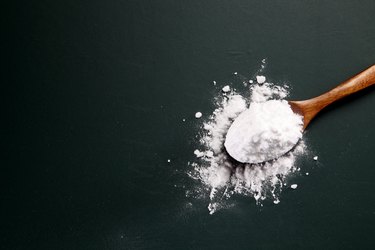
Baking soda — or sodium bicarbonate — is traditionally used for baking, cleaning and reducing household smells. But not everyone is aware that you can take sodium bicarbonate for muscle cramps or soreness.
Muscle soreness and fatigue are a result of lactic acid buildup and the overall damage to the muscle fibers. While several expensive supplements are available that claim to reduce, or even eliminate, muscle soreness, you can use baking soda for muscle soreness.
Video of the Day
Video of the Day
Read more: Does Baking Soda Help You Lose Weight?
Sodium Bicarbonate and Lactic Acid
During physical activity, the body produces lactic acid that raises the acidity level within the muscles and blood vessels. Baking soda, when mixed with water, creates an alkaline solution that helps to buffer the acidity level within the blood and muscles.
As a result, the lactic acid is drawn out of the muscle cells, causing the acid-base balance, or pH level, of the muscles and blood to return to equilibrium. Also, taking baking soda before and during physical activity can help to prolong lactic acid buildup.
Who Would Benefit?
Not everyone should use baking soda for muscle soreness. Runners, including sprinters and endurance athletes, have used baking soda as a lactic acid buffer for decades. Other athletes who may consider using baking soda includes swimmers, rowers and triathletes.
Despite the numerous benefits for muscle soreness, there is still the potential for several negative side effects. Always consult a doctor before using baking soda for muscle soreness — sodium bicarbonate can interact with many difference medications, according to the Mayo Clinic.
Is It Effective?
By reducing muscle soreness with baking soda, your overall performance can improve. According to a small study published in June 2015 by the Journal of the International Society or Sports Nutrition, ingesting sodium bicarbonate prior to exercise improved performance of high-intensity activities in 13 trained male athletes.
The study concluded that benefits of baking soda during exercise included stabilizing blood pH, increased threshold for the accumulation of lactic acid in the blood and reduced levels of perceived exertion.
Read more: How to Take Baking Soda & Apple Cider Vinegar
Proceed With Caution
Athletes are routinely monitored and checked for various illegal substances. As of 2019, baking soda isn't banned by major organizations such as the NFL, NBA, NHL, MLB or NCAA, but these regulations are subject to change.
Always check with the governing body regarding doping regulations. Even though baking soda might be legal in your sport, there are several potentially harmful side effects.
The ingestion of large amounts of baking soda can lead to toxicity. In a July 2016 case study presented by the Western Journal of Emergency Medicine, the patient developed hemorrhagic encephalopathy — bleeding in the brain — after ingesting a large amount of baking soda.
Symptoms of sodium bicarbonate toxicity can include abdominal pain, nausea and vomiting. Less commonly, this condition can also cause neurological symptoms such as fatigue, seizures, involuntary eye movements, coma or even death. Be sure to inform your doctor if you consume baking soda for any reason.
- Mayo Clinic: "Sodium Bicarbonate (Oral Route, Intravenous Route, Subcutaneous Route)"
- Journal of the International Society of Sports Nutrition: "Sodium Bicarbonate Intake Improves High-Intensity Intermittent Exercise Performance in Trained Young Men"
- Journal of Physical Therapy Science: "Effect of Lactate Accumulation During Exercise-Induced Muscle Fatigue on the Sensorimotor Cortex"
- Western Journal of Emergency Medicine: "Hemorrhagic Encephalopathy From Acute Baking Soda Ingestion"
Was this article helpful?
150 Characters Max
0/150
Thank you for sharing!
Thank you for your feedback!